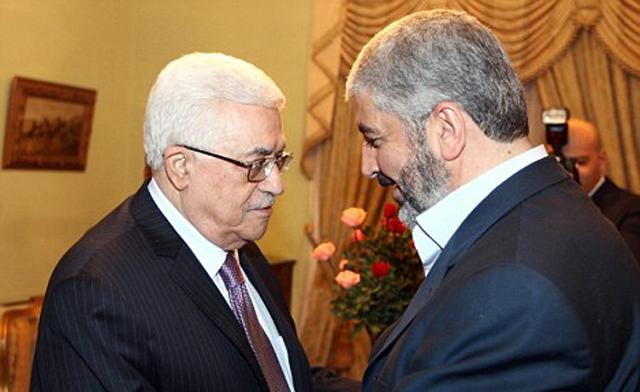That collective freakout you heard this morning between Jerusalem and Washington? ![]()
![]()
It was the entirely premature overreaction of both the US and Israeli governments to a one-page agreement between the two competing Palestinian factions that attempts, for the third time since their 2006-07 rupture, to unite Fatah (فتح), which currently controls the West Bank, and Hamas (حماس), which currently controls the Gaza Strip.
The agreement is hardly definitive, and it follows two failed deals agreed to in high-profile meetings in Cairo and Doha over the past three years. It commits the two factions to an interim unity government within five weeks, with elections to follow within six months. Needless to say, it’s an incredibly preliminary deal, and there are countless opportunities for West Bank leader Mahmoud Abbas and Gaza prime minister Ismail Haniyeh to derail it.
With a preliminary deadline of April 29 approaching for US-brokered peace talks between the West Bank and Israel, it’s clear that neither the United States nor Israel believe that the potential reconciliation is an incredibly positive sign. Israeli prime minister Benjamin Netanyahu went so far as to describe the agreement in zero-sum terms:
Israel immediately responded by saying the Palestinian president, Mahmoud Abbas, was moving to peace with Hamas instead of peace with Israel. “He has to choose,” said the prime minister, Binyamin Netanyahu. “Does he want peace with Hamas or peace with Israel? You can have one but not the other. I hope he chooses peace, so far he hasn’t done so.”
After the agreement was announced, Israel cancelled a planned session of peace negotiations with the Palestinians. It also launched an air strike on a site in the north of the Gaza Strip, wounding 12 people including children, which underscored the deep mutual suspicion and hostility that persists. Speaking in Ramallah in the West Bank, Abbas said in his view the pact with Hamas did not contradict the peace talks he was pursuing with Israel, adding that an independent state living peacefully alongside Israel remained his goal.
Needless to say, Israel’s freakout won’t facilitate future negotiations. Meanwhile, the US government is already talking about suspending aid to any future unity government that includes Hamas:
The United States would have to reconsider its assistance to the Palestinians if Islamist group Hamas and the Palestinian Liberation Organization form a government together, a senior U.S. administration official said on Thursday….
“Any Palestinian government must unambiguously and explicitly commit to non-violence, recognition of the state of Israel, and acceptance of previous agreements and obligations between the parties,” the U.S. official said, listing terms Hamas has long rejected. “If a new Palestinian government is formed, we will assess it based on its adherence to the stipulations above, its policies and actions, and will determine any implications for our assistance based on U.S. law,” the official said, speaking to Reuters on condition of anonymity.
Foreign aid, in part, is responsible for an economic boom in the West Bank, and, particularly, in its unofficial capital of Ramallah. So it’s a step that would cause some significant hardship to Abbas, undermining the most reliable Palestinian partner that the US and Israeli governments currently have. It’s not hard to see Palestinian voters delivering a resounding Hamas victory in a vote later this year if the United States and Israel take such a hard line.
But Netanyahu or US secretary of state John Kerry couldn’t have seriously believed that a truly lasting Palestinian-Israeli peace deal could exclude Gaza, which is home to 1.4 million Palestinians; the West Bank is home to 2.4 million. It’s farcical to believe that Abbas or anyone could deliver any true stability for Israel or Palestine while Gaza remains a 1.4 million-strong refugee camp, notwithstanding the West Bank’s position. Continue reading Palestinian unity need not hinder the cause of peace with Israel

